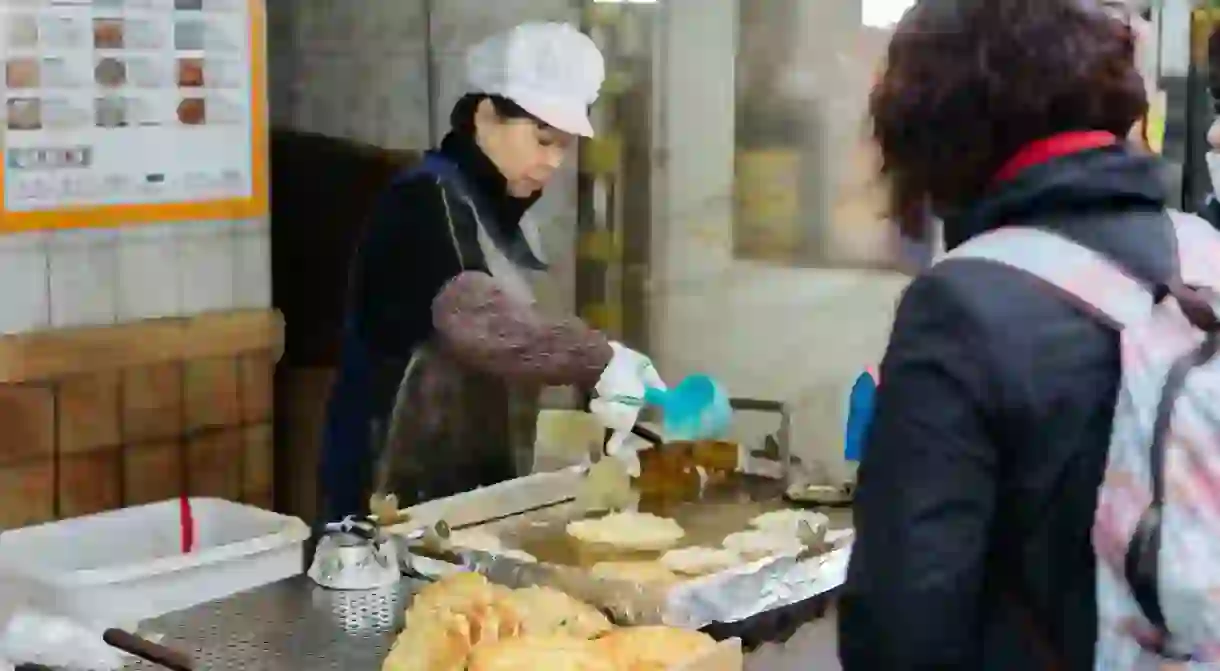The Top 15 Korean Phrases You Need to Know

Headed to South Korea? These Korean phrases can be applied in numerous circumstances and will not only help you navigate the streets, markets and social situations you may find yourself in, but will also earn you a lot of respect from the locals.
Want to put your new knowledge to use on your travels? Be sure to book ahead for the best tours of South Korea and make the most out of your trip.
안녕하세요 – An-nyeong-ha-se-yo. – Hello.
Although straightforward, this expression is a necessary inclusion and is without doubt the most common phrase anyone in Korea will use. There are dozens of variations to account for slightly different situations and levels of respect, which can get fairly complicated for the non-Korean speaker. The trick is to say it quickly and slur the syllables together. Do this and everyone will understand you.
반갑습니다 – Ban-gap-sum-ni-da. – Nice to meet you.
Just like its English equivalent, this expression should be used whenever you find yourself suddenly introduced to a new face. In formal settings, this expression is usually accompanied by a bow and a handshake to show respect.
감사합니다 – Kam-sa-ham-ni-da. – Thank you.
This is probably the most important expression to learn during your Korean travels. Use it exactly as you would its English equivalent. Don’t understand what the smiling halmeoni (grandmother) sitting next to you on the subway is saying? It’s probably a compliment; smile and say thank you.
밥 먹었어요? – Bap meo-geo-seo-yo? – How are you?
Literally meaning, “Did you eat rice?” this phrase is used to show your concern for someone’s well-being. In Korea, food – in particular, rice – is central to the culture and was not always so easy to come by. While Korea has an abundance of food now, the phrase still remains as a greeting to show concern for others. If someone asks you this, simply reply “Nae, meo-geo-seo-yo” (Yes, I ate), which is the expected response, even if you haven’t actually eaten anything.
잠시만요 – Jam-shi-man-yo. – Excuse me./Just a moment.
Literally, “little time stop”, use this to get the attention of others, ask them to move out of the way or tell them to wait. If you’re trying to get off an elevator, for example, but no-one’s moving. Use this phrase to politely maneuver your way through the crowd.
최성합니다/미안합니다 – Chway-seong-ham-ni-da./Mi-an-ham-ni-da. – I’m sorry.
There are two ways to be apologetic in Korean. The first is an “I’m sorry I bumped into you” sort of apology, while the latter is more of a “I’m really sorry I forgot about your birthday, please forgive me”, kind of apology.
주세요 – … ju-se-yo – Please (Please give me…)
Slap this word on the end of just about any verb stem to make a polite request. Got a sudden food craving? Bibimbap, ju-se-yo! Thirsty? Kaw-pi (coffee), ju-se-yo! In need of some loving? Bbo bbo (kiss), ju-se-yo!

어디예요 – Eo-di-ye-yo…? – Where is the…?
Unless you’re a hermit, chances are you will definitely use this phrase at some point, at the very least to find the hwajangsil (bathroom). You can also use it to locate an item at the supermarket, find the nearest subway station, or to track down a good noraebang (karaoke room).
얼마예요 – Eol-ma-ye-yo? – How much is it?
A must-know for any shopping trip, this phrase is pretty much all you need, since most vendors have calculators on hand to help out with the numbers. Browsing a traditional market and want to bargain a bit? Use the phrase bi-ssa-yo (it’s expensive) to see if you can’t get the salesperson to go down a few hundred won.
많이 드세요 – Man-hee deu-se-yo – Have a great meal.
Similar to “Bon appetite”, this expression literally translates to “Eat a lot”. Following the Korean War, food shortages were widespread across the country. Therefore, this was a polite thing to say while serving food to others.
잘 먹겠습니다 – Jal meok-ge-sseum-ni-da – I will eat well.
If dining at a Korean’s home, or being treated to a meal by a Korean, use this phrase before eating to show appreciation to your host. It’s similar to saying “Thanks for your efforts. I’m going to have a great meal because of you”.
잘 먹었습니다 – Jal meo-geo-sseum-ni-da – The meal was good.
If you haven’t noticed by now, table manners (not to mention food in general) are pretty important in South Korea. Just as you said the previous phrase before the meal, use this one following the meal to once again thank your host for the food.
사랑해 – Sa-rang-hae – I love you.

This is the informal way of saying, “I love you” and is used between people that are close, such as lovers, making it one of the most commonly used expressions in Korean dramas. If someone says “I love you” in Korean, then you can reply with “Na-do sa-rang-hae”, which means “I love you, too”. To make it into a question (Do you love me?), simply say it with a rising intonation (Sa-rang-hae?).
가세요 – Ga-se-yo – Go in peace.
When you directly translate this expression – “Please go” – it may sound a bit harsh. But it is actually very polite and means that you wish the other person a safe journey wherever he or she is going. You can use this even if don’t know the destination of the person you are saying it to.
화이팅 – Hwa-it-ting – You can do it!
While the word comes from the English term “fighting”, it’s more of a cheer that Koreans use to show encouragement and enthusiasm. It can also be used in sports, to cheer up someone who is having a difficult time, or to wish a friend good luck on a blind date.













